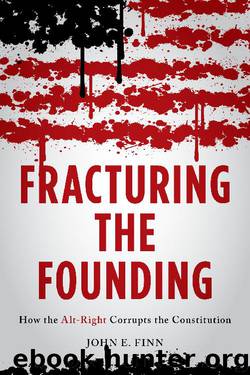Fracturing the Founding by John E. Finn

Author:John E. Finn [Finn, John E.]
Language: eng
Format: epub
Publisher: Rowman & Littlefield Publishers
Published: 2012-06-15T00:00:00+00:00
A similar publication, “Our Right to Bear Arms Is a God Given Individual Right,” appears on the homepage of the Sherriff Brigades of Pennsylvania.[22] The Brigades takes Justice Scalia to task for Heller, saying, “Disappointedly, Justice Scalia is wrong to consider that there are any limitations of this constitutionally secured, protected and guaranteed right. For example, Citizens can lawfully have a tank in their driveway, ready to fire, in order to repel an invader/trespasser on their property.”[23] It concludes with the claim that “We all have a God given, individual right to bear arms, any arms!”[24]
I can find no evidence that this last claim is not serious. Here the absolute nature of Alt-second amendment rights is almost comically (or is tragically?) clear, as is the difference between the Alt-second and the Court’s pro-gun decisions in Heller and McDonald. The Alt-second amendment does not simply protect your right to own a gun—it protects your right to own a weapon. Any weapon. If the Alt-second Amendment protects your right to own a tank, then it must protect my right to own a fighter plane or an aircraft carrier. Or a Death Star.
The argument that a repealing amendment would be unconstitutional thus starts from an interesting premise: Some parts of the Constitution are inferior to God’s law or so essential to what the Constitution means that they cannot be repealed, removed, or denied. An amendment that repealed the Second Amendment would thus be unconstitutional.[25]
The claim that a constitutional amendment, especially one that complies with all of the rules concerning how the process works, could nevertheless be unconstitutional, is not entirely novel. In a fascinating but fairly obscure case from early in the twentieth century, Leser v. Garnett (1922), the State of Maryland asked the Supreme Court to declare the Nineteenth Amendment (extending the vote to women) unconstitutional because “so great an addition to the electorate, if made without the state’s consent, destroys its autonomy as a political body.” Justice Brandeis casually dismissed the argument, saying simply, “This amendment [the Nineteenth] is in character and phraseology precisely similar to the Fifteenth. For each, the same method of adoption was pursued. One cannot be valid and the other invalid. That the Fifteenth is valid, although rejected by six states, including Maryland, has been recognized and acted on for half a century.” The Court’s response was politically astute, but on the merits it leaves something to be desired.
The notion of an unconstitutional constitutional amendment suggests still another question: Can parts of the Constitution be unconstitutional? Is there a way to argue that even without a repealing amendment, the Second Amendment is unconstitutional, no matter what it says or how we interpret it? We might appeal to the idea that some parts of the Constitution are so central to what the Constitution is or means or hopes to do, to suggest that the Second Amendment is unconstitutional because it defeats those fundamental purposes. Whatever it meant and whatever its necessity at the Founding, we might say, in our time the Second Amendment does not advance constitutional ideals—it sabotages them.
Download
This site does not store any files on its server. We only index and link to content provided by other sites. Please contact the content providers to delete copyright contents if any and email us, we'll remove relevant links or contents immediately.
| General | Discrimination & Racism |
Nudge - Improving Decisions about Health, Wealth, and Happiness by Thaler Sunstein(7191)
iGen by Jean M. Twenge(5126)
The Fire Next Time by James Baldwin(4987)
Adulting by Kelly Williams Brown(4197)
The Hacking of the American Mind by Robert H. Lustig(4051)
The Sports Rules Book by Human Kinetics(4045)
The Ethical Slut by Janet W. Hardy(4008)
Captivate by Vanessa Van Edwards(3698)
Mummy Knew by Lisa James(3495)
In a Sunburned Country by Bill Bryson(3333)
The Worm at the Core by Sheldon Solomon(3293)
Ants Among Elephants by Sujatha Gidla(3260)
Suicide: A Study in Sociology by Emile Durkheim(2885)
The Slow Fix: Solve Problems, Work Smarter, and Live Better In a World Addicted to Speed by Carl Honore(2818)
The 48 laws of power by Robert Greene & Joost Elffers(2739)
Humans of New York by Brandon Stanton(2661)
Handbook of Forensic Sociology and Psychology by Stephen J. Morewitz & Mark L. Goldstein(2588)
The Happy Hooker by Xaviera Hollander(2561)
The Tipping Point by Malcolm Gladwell(2528)
